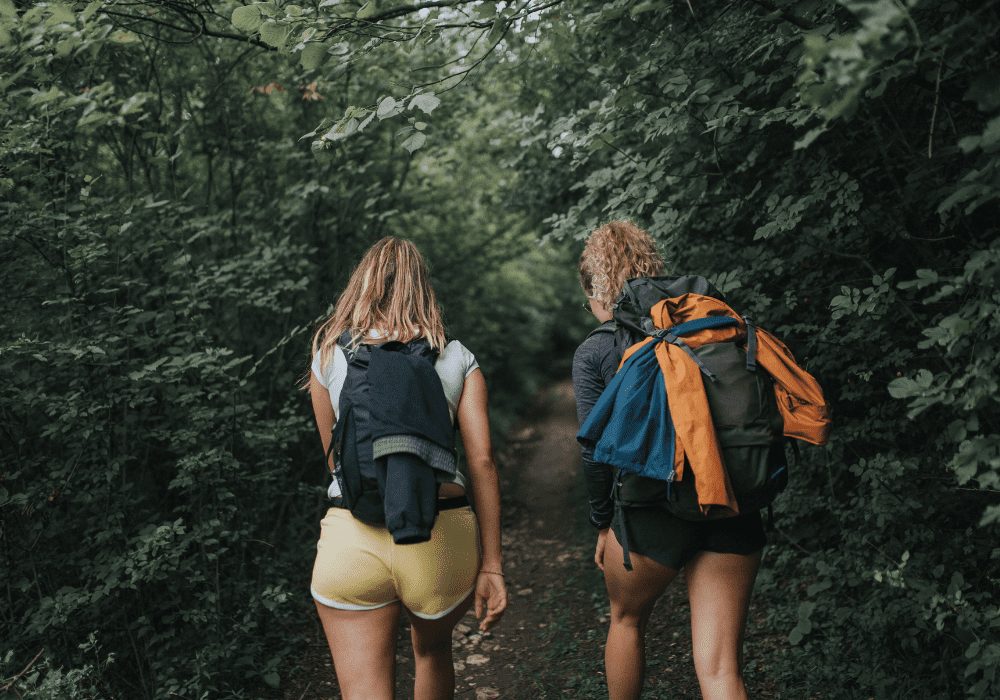
What Gear To Bring on A Day Hike
Estimated reading time: 10 minutes
Deciding what gear to bring on a day hike is something most hikers struggle with at some point.
When planning for a hike, whether alone or with friends, it’s important to be adequately prepared. Anything can happen, even on a day hike, that’s why it’s important to be fully equipped.
Choosing the right hiking gear puts you in a better position to handle challenges that may arise. What gear to bring on a day hike depends on a few factors.
This may include location, distance, time and terrain. Weight is also important as you do not want to be slowed down by a bulky load.
Knowing what to bring on a day hike is important for preparation. This psychologically prepares you for the hike and any other thing that might happen.
Depending on your needs, the following are part of a standard day hiking gear list.
By the way, here are 18 Ways To Get Into Hiking, All Your Questions Answered.
Table of Contents
This is What Gear To Bring On A Day Hike
1. Hiking Wear
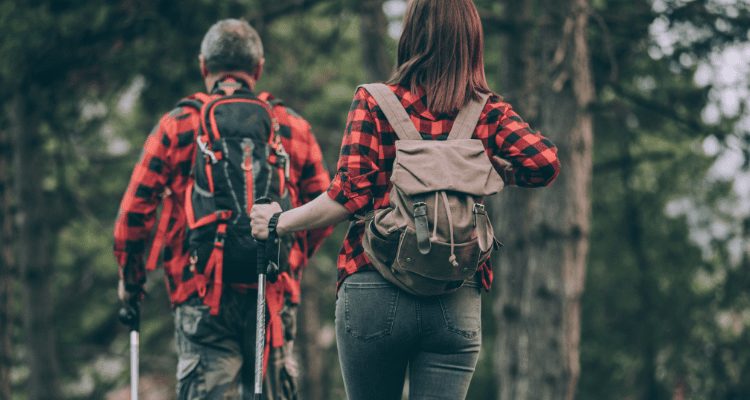
Adam and Fatima color coordinating on our day hike in Serbia
This involves both clothes and footwear. It is important to choose something suitable for the demands of your hike.
It is always important to consider the weather when deciding on your hiking equipment.
On a cold day, hoodies, gloves and neck warmers can particularly be important. Sunglasses, hats and light clothes are crucial in hot weather.
High-quality hiking clothes include:
a) The Patagonia Torrentshell 3L Jacket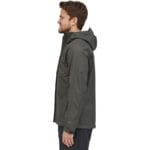
My wife and I each received one of these Torrentshell Jackets from Patagonia to try out, and so far we both really dig this Jacket. It comes at a low cost and with high durability.
It can also be worn with hip belts when carrying a backpack.
Here are 20 Savvy Tips For Hiking In The Rain.
b) The Backcountry Mantle Climb Jogger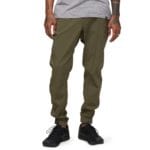
Was pleasantly surprised by these Mantle Climb Joggers.
They are suitable for both men and women. They are light with pockets for carrying light hiking equipment.
Good quality hiking foot ware includes:
c) Brooks Cascadia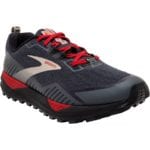
The Brooks Cascadia are my favorite day hiking shoe, by far. It all started when a friend gave me a pair of used brooks that didn’t fit him, more than 10 years ago.
It blew my mind how light, and truly durable they were. Those shoes lasted 5 years, through abuse, and more than a thousand miles of trails.
They’ve been my go-to day hiking shoe brand ever since.
They are light and very durable shoes. A cross between trail runners and hiking shoes. I find them best suited for day hiking and they come with my highest recommendation.
d) Organic Wool Hiking Socks 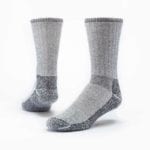
These organic wool hiking socks are available to both men and women. They’re light and have anti-microbial properties.
They are some of the best day hiking and trail running socks.
2. Navigation Equipment
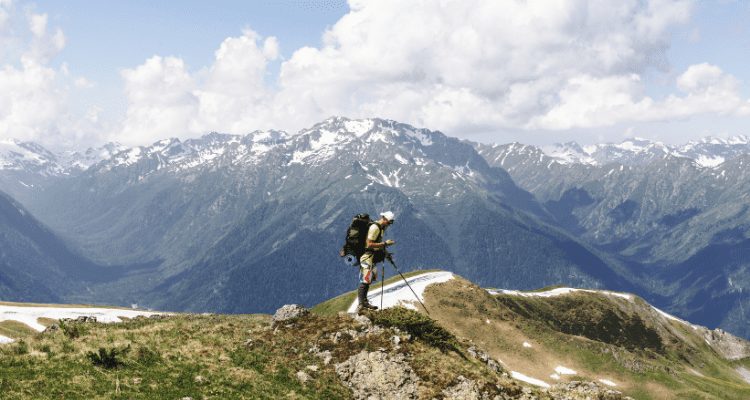
Using my Delorme GPS on a hike in Colorado
One of the worst things that can happen on a hike is getting lost on the trail. It is therefore important to make sure you have the necessary navigation material.
The following can help in navigation:
a) Printed Hiking Maps
Having a hardcopy/printed map on the ground is very important. Some trails have multiple splits making it easy to get lost.
The map gives you a sense of direction and ensures you remain on course and it doesn’t require batteries.
b) A Light Hand Carried GPS Device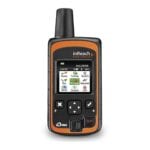
These devices can be linked on a mobile phone in case there is no map. You can also use reliable physical GPS devices such as the Garmin 64st.
It is handheld because of its weight.
We carry a couple different options, you can just Shop Outdoor Adventure Gear.
3. Backpacks
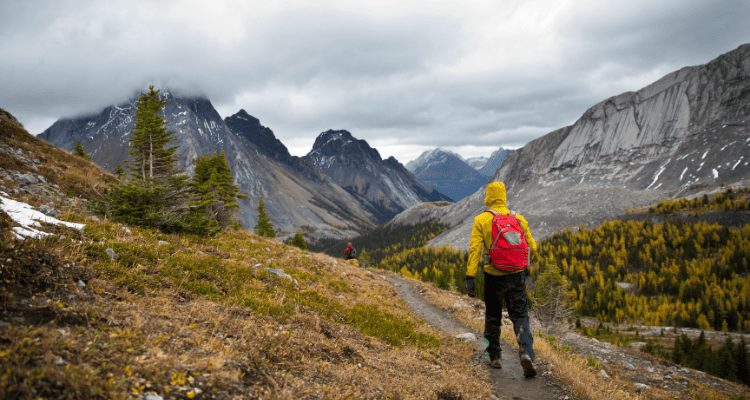
Cassius falling behind (taking pics) on a day hike in the Rockies.
Backpacks are very important when hiking. Depending on what to bring on a day hike, you should choose a backpack capable of carrying all your hiking materials.
Some high-quality bags to consider for hiking include:
a) The All-Round Hyperlite Mountain Gear Southwest 2400 & 4400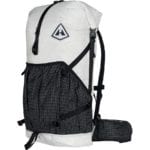
I have used Dakine backpacks for Snowboarding, hiking and biking for well over a decade now. They are my favorite…
That said, the Hyperlite Mountain Gear Southwest was a product my team and I were asked to try out and I gotta say, I like it, a lot.
This is a durable, light and waterproof bag. It can carry heavy equipment without getting torn. It is one of the more commonly used backpacks on technical hiking trails.
b) The Comfortable DAKINE Builder 40L Backpack & Split Adventure 38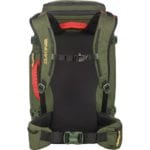
Again, I have used the same Dakine backpack for most day hikes, for years. But I was recently given a free Dakine Builder 40 and a Split Adventure 38 for my wife and I to test, and they both rock.
No surprise there.
Each has well-cushioned back panels for carrying your gear and can be used to carry snowboards as well.
The Split 38 is more suitable for carrying lighter loads.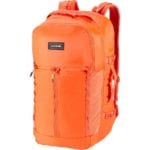
The Builder 40 is great for carrying slightly heavier loads.
If you’re looking for something lower cost, but will still get the job done, checkout our ultralight, heavy-duty outdoor day pack.
4. Food, Snacks and Water
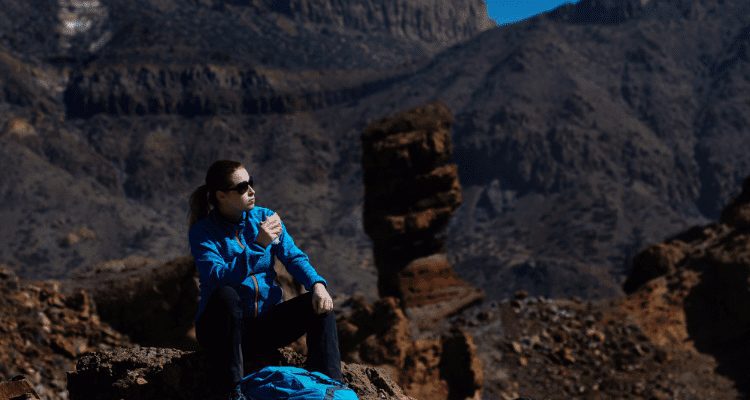
Nancy vibing with a sandwich and some Utah views during an early fall hike
Even though hiking is an exciting activity, it often gets tiring and exhausting. For this reason, it is important to carry some food supplies.
Replenish your energy with light snacks like cookies, sandwiches and chocolate bars. The food should not be bulky to interfere with the hike.
For drinks, water is mostly taken because of its many health benefits. Natural energy drinks are also good when tired.
If you’re going on a longer hike, check out our Backpacking Meal Planning 101.
5. Small First Aid Hiking Kits
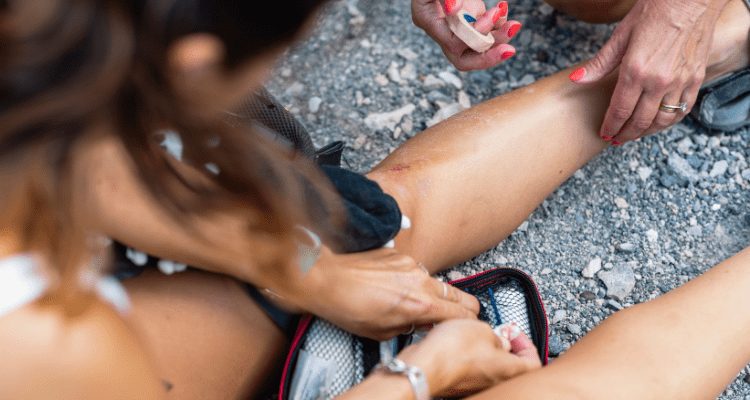
My sister slipped on some loose gravel during a Mother’s Day hike…
Hiking trails are different depending on their location. Some can be slippery, extremely dry and rocky. This means possibilities of accidents happening should not be ruled out.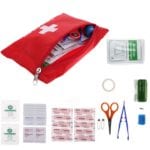
Apart from accidents, other medical emergencies can also happen because of the demands of hiking. It is therefore important to always have a first aid kit whenever on a hike.
I recommend at the very least you carry our small Emergency Hiking and Camping First Aid Travel Pouch.
Learning how to do basic first aid procedures is an added advantage with the kit.
6. Sun Protection

Ricky looking majestic with that sweet beard during our day hike in New Mexico last year.
Direct sunlight during hiking can be a big challenge. This increases body activity and leads to quick exhaustion and fatigue.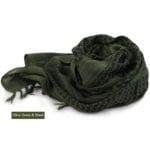
This also exposes the skin to sunburn. Fortunately, the effects of the sun can be minimized.
When making a list of what to bring on a day hike, sunscreen, sunglasses and an authentic Shemagh should always be on the list.
7. Other Hiking Equipment You Might Consider

Chase with his lucky manzanita hiking stick during an evening hike in Northern California
Apart from the main hiking essentials discussed, there are other minor hiking requirements you might consider.
All this is in a bid to ensure your hiking experience goes well.
This includes:
a) Antimicrobial Hand Sanitizer
This is useful in killing germs that come in physical contact through touching while on a hike.
b) Trekking Poles or a Good Stick For Physical Support
This comes in handy mostly for first-time hikers and hikers with injury issues. They help in walking and provide support to the user.
c) Facial and Wet Wipes
They are essential in wiping off dirt and sweat. They can also be used to wipe hands before and after a meal or snack during hiking.
Conclusion
Hiking is one of the most involving and enjoyable outdoor activities. It is fun but sometimes unexpected things can happen.
People can get lost, accidents can happen. It is important to adequately prepare yourself for any unplanned event when hiking.
Having a day hiking gear list of the required necessities ensures you are prepared to handle any arising situation.
Shop Outdoor Adventure Gear today!
-David Aston
P.S.
These are 8 of the Best Places For Outdoor Family Adventure in the United States


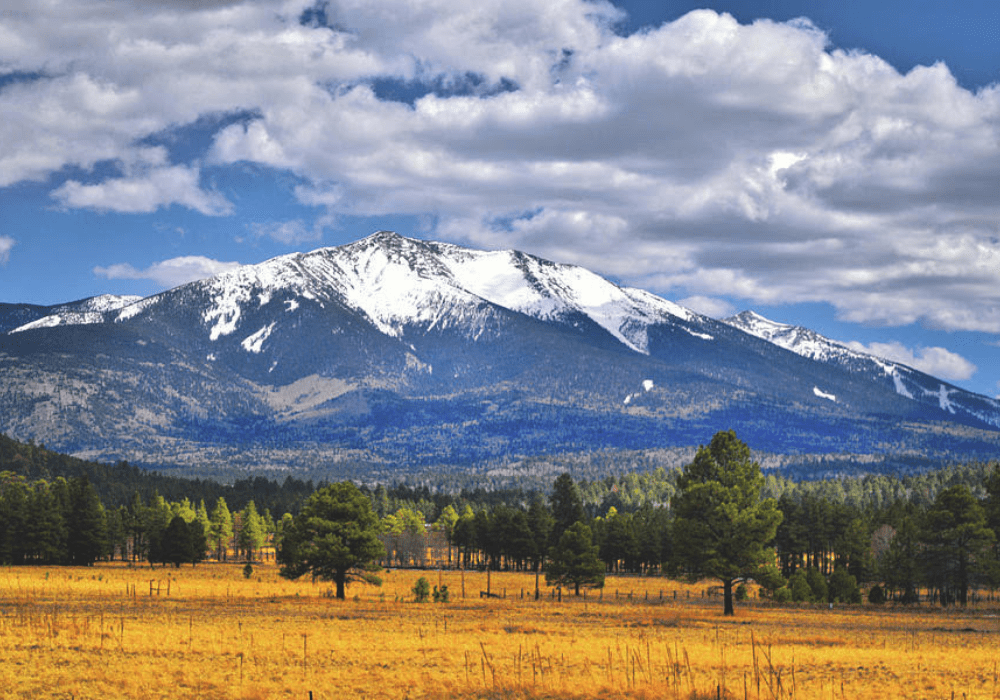
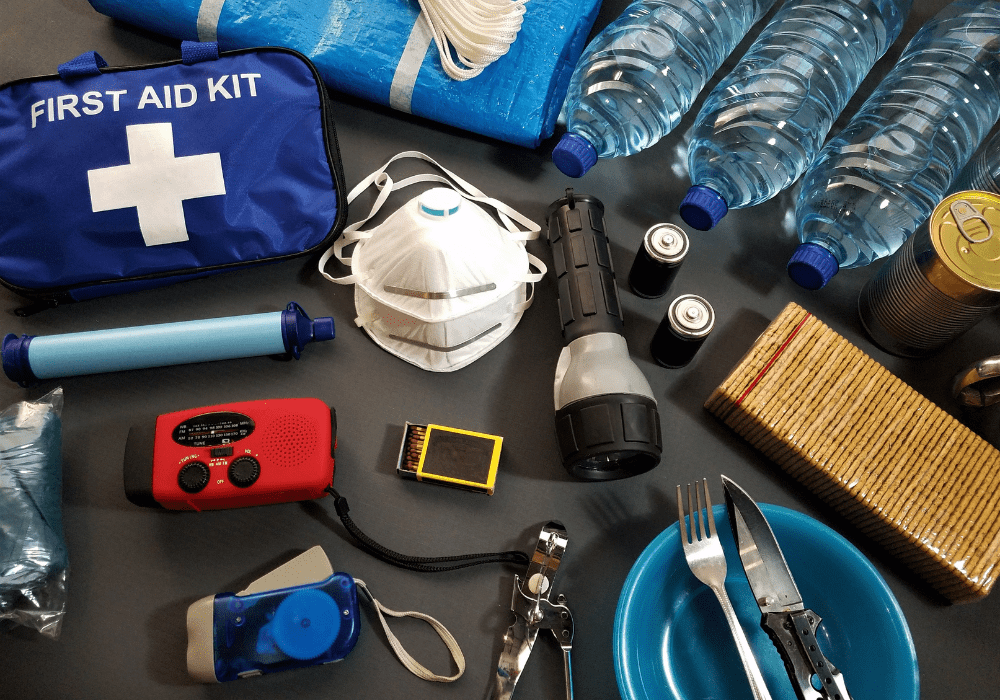
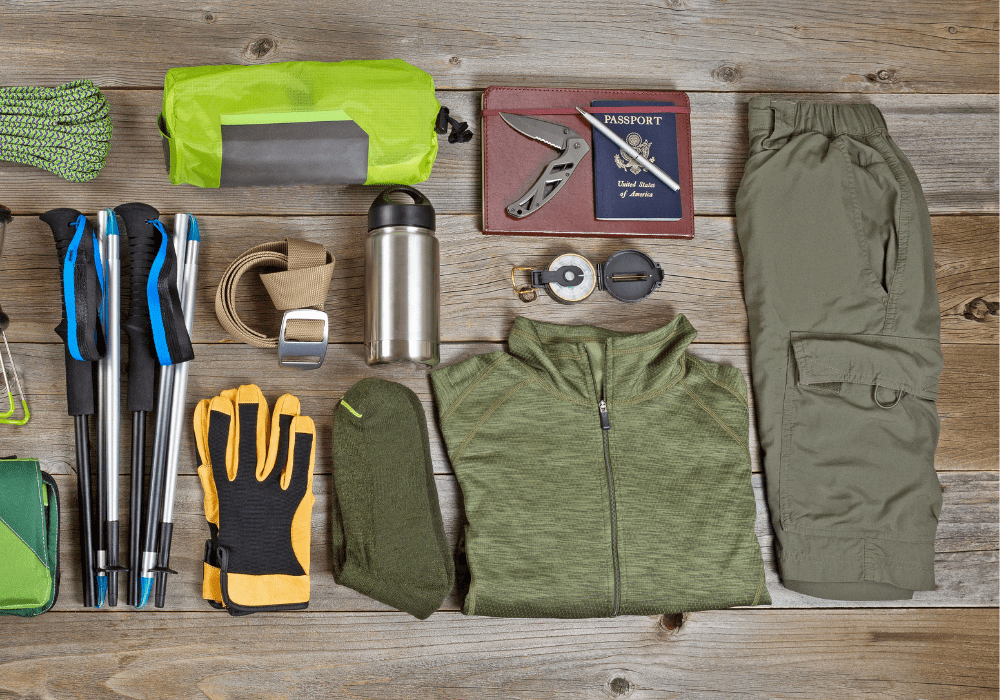
Pingback: 15 Best Trail Towns In The United States - AdventureHacks
Pingback: 8 Tips for How to Stay Clean While Camping - AdventureHacks
Pingback: 9 Helpful Tips for Hiking in the Desert - AdventureHacks
Pingback: 9 Benefits of Training for a Hiking Trip - AdventureHacks
Pingback: Day Hiking Checklist - AdventureHacks